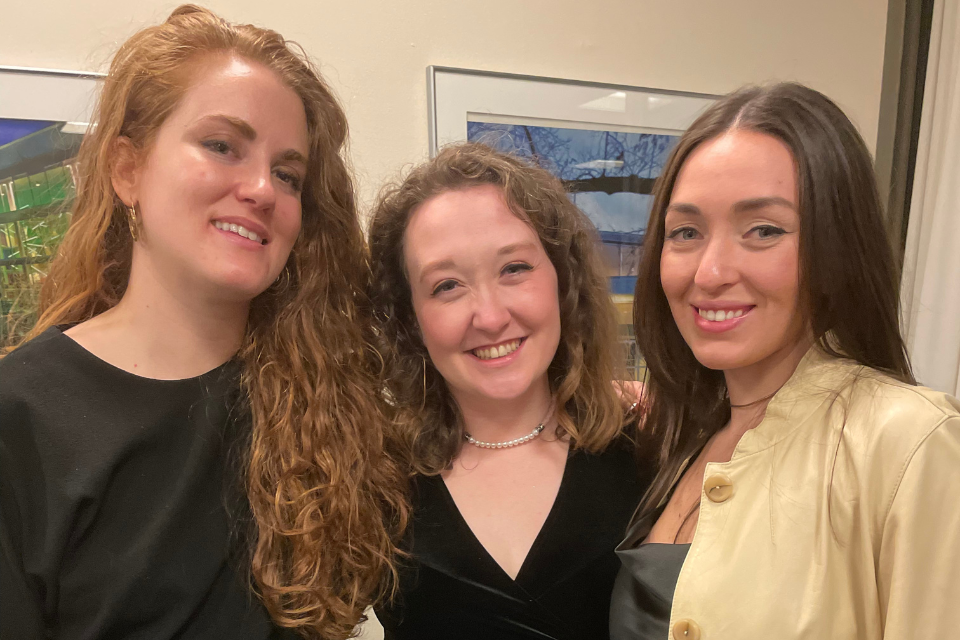A “Neu.” Angle – A Spark Team’s Journey

Article by Kira Schwartz
In late 2021, researchers at MIT developed a material they dubbed OmniFiber, which can be woven into a special fabric that can sense and regulate physical activity, such as breathing or other movements. While the researchers behind OmniFiber are exploring the broad possibilities of their material, a small team at Brandeis University saw its potential to aid in another issue: mental health.
The team behind Neu. originally met in a Social Entrepreneurship class in 2021. Monica Oxenreiter, Heidi Mizenko, and Marissa Bresnahan teamed up to brainstorm a social venture based in the healthcare industry. They decided to create a venture that would cater to Gen Zers and millennials struggling with mental health issues. Mental health has grown as a mainstream topic in the \ the current social climate, with Covid-19, rising housing costs, and a tumultuous job market being some of the contributing factors. Since anxiety is a common symptom of many mental illnesses, the team considered several products that would help alleviate stress, such as fidget rings and pressure point bracelets. They soon came across OmniFiber, which at the time had been fashioned into a tube of fabric to regulate the breathing of Covid-19 patients. Oxenreiter, Mizenko and Bresnahan realized the potential of the fabric and came up with the idea of a tank top woven from OmniFiber that could be discreetly worn under regular clothing. This garment would help regulate the wearer's breathing and assist in mitigating breathing issues that may accompany anxiety attacks.
When the team presented their concept to a panel of judges at the close of the semester, one of the judges, Associate Provost for InnovationRebecca Menapace, suggested the team apply for the Spark program as it could give them the chance to make their idea a reality. Inspired by her encouragement, the Neu. team refined their concept and presented it at the SparkTank startup pitch event, where it was accepted into the Brandeis Virtual Accelerator Spark program and they began expanding on the idea in earnest.
With the support of the Spark program, the team considered the breadth of their product's potential. Marissa Bresnahan recalls, "Initially, our launch into the marketing sphere was going to be...anxiety and mental health in general." Anxiety is a common symptom of several mental conditions, including ADHD, OCD, and dementia. The team also considered marketing their product to LGBT youth: "[W]e started really looking at LGBTQ shelters...a lot of these kids are dealing with a litany of things that they're trying to navigate, and the baseline for a lot of what they're probably feeling as they're navigating through these changes is anxiety." While the team considered an older demographic, they decided to stick to their original plan to market to a demographic of teens and young adults between ages 14-30: "[Our team wanted to focus] on young people...[We didn't want] to rule out the aging population...we had anticipated participating in the Spark program would help us build out that market segmentation."
The Spark program connected the team with the MIT labs that produced OmniFiber and encouraged them to narrow the scope of their project; rather than produce an entire apparel line, the Neu. team decided to focus on the development of an OmniFiber tank top. The Spark program helped the team set guidelines on how to move forward with the partnering process and gave them guidance when it seemed they hit an obstacle. Bresnahan recalls how the Spark program helped the team build their concept into something that could be a marketable product: "Entrepreneurship is never quite a straight line, but to have individuals from Spark walk us through...the great thing about entrepreneurship is you don't necessarily have to take a pathway. Sometimes you just throw ideas at the wall and see what sticks. But Spark definitely helped us refine exactly what it is that we were thinking of. It helped us take [Neu.] from a school project to something that could actually be a reality."
The Neu. team wanted more than just a product; they wanted to be a platform that could be used to access mental health resources the public may not realize were readily available: "We want[ed] to do something that is accessible for young adults who are feeling anxious because of what...is going on. [A question we wanted to answer was] how do we provide not only hard resources, being the tank top, but also soft resources for them to have access to and create conversation and dialogue around?" Throughout Neu.'s development, the team's goal did not waver. While they recognized other industries may have interest and use for the OmniFiber tank top, they wanted to ensure their priority remained with their target demographic.
Sometimes it is not the destination that is most important, but the journey an endeavor takes us on. While the Neu. team was unfortunately unable to move forward with the Spark program due to scheduling conflicts, the experience was nevertheless unforgettable. The Spark program provided valuable input on Neu.'s potential as a product and helped the team focus on how they could make the OmniFiber tank top the best it could be. While it is regrettable the team could not continue its work, Bresnahan and the others look back on their time in the program fondly. "If I'm providing a resource to someone that helps ease something...then I find that as a goal accomplished," says Bresnahan. "We're making someone feel good. We're making someone feel better about something they didn't feel great about." The Neu. team saw the potential in OmniFiber to accomplish more than its original developers had set out to do, and while they may be unable to continue with their work, their research will impact how others view the material and has opened possibilities of its use in the future.